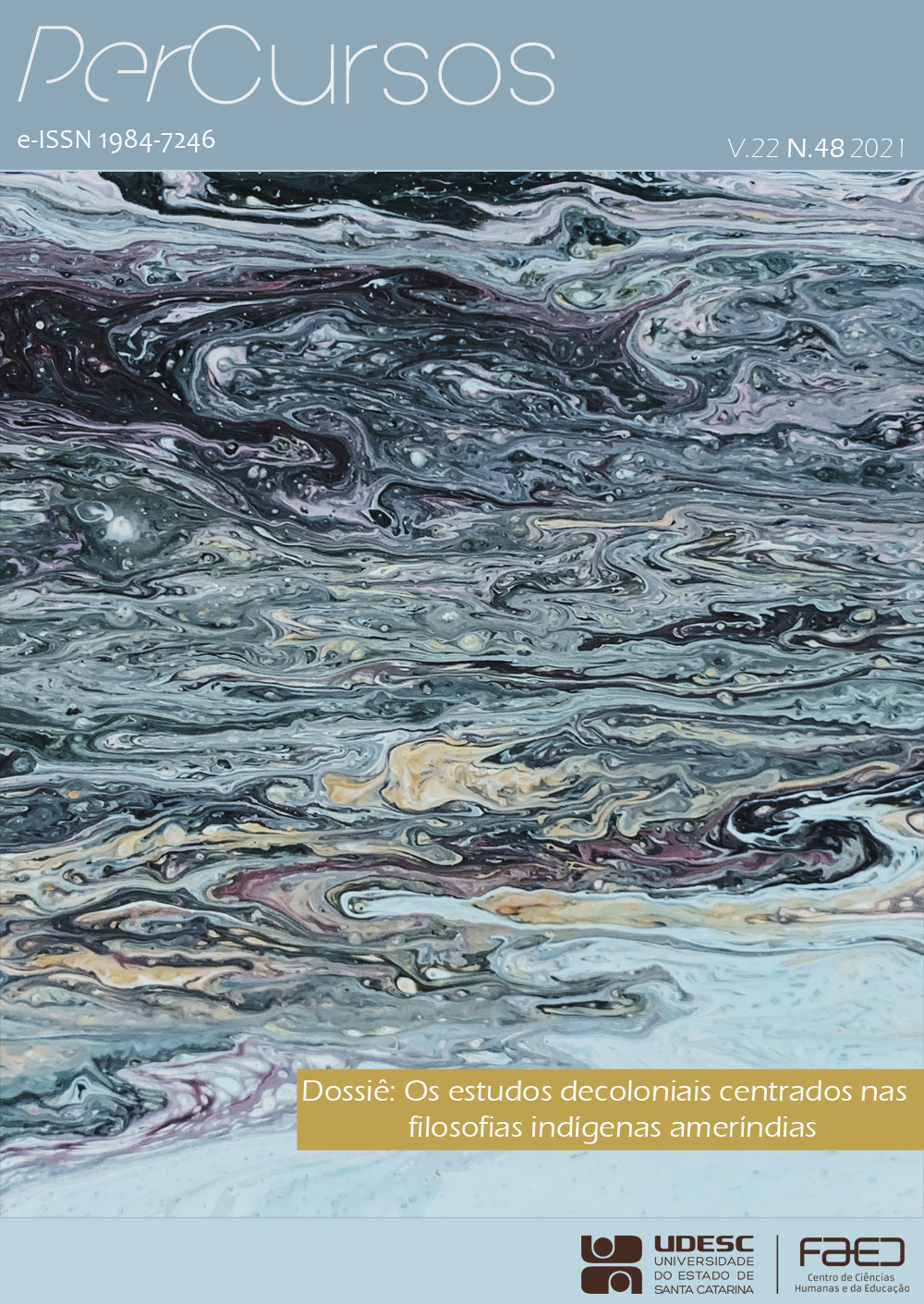Mirror mirror mirror ... the narcissistic wound of phallocentric colonialism
DOI:
https://doi.org/10.5965/1984724622482021061Keywords:
Feminism, Decolonial, Gender, RacismAbstract
What would happen if our bodies spoke, if our gagged mouths screamed the silence of all those centuries? Grada Kilomba in The memory of the plantation shows us that through the creation of a new decolonial language it is possible to reconstruct the structures of power and that marginalized identities can then reconfigure the notion of knowledge. We know that the modern patriarchal system has historically colonized our narratives, our languages, which are untranslatable to colonizers, with language being a regulatory ideal. bell hooks on And I'm not a woman? describes how the literature was effective in creating an imaginary of black bodies. Lugones tells us how the modern colonial gender process imprisons Latin American bodies, or even, as Lélia Gonzalez calls it, Amerifricans. Based on these voices and decolonial feminist thinking, I defend the urgency that we have to create a new language, escaping the grammatical restrictions that pervade gender, sexuality and raciality, these categories being interwoven. It is necessary to take a position of authors and not of objects, to narrate our own history, giving way to another vocabulary, denouncing our silences, our colonizing gags masks, our tortured voices, our broken languages, imposed languages, im-peded speeches. Writing is, therefore, an act of resistance and a collective and political hun-ger to gain a voice. I propose a work that is both a political discourse and a personal and poetic narrative, which places the precariousness, the pain, the emotion, the experiences of the Amerifrican corporations incorporated in the discourse and which breaks with the mod-ern capitalist colonial logic, and which also patriarchal.
Downloads
References
ABYA YALA. In: Enciclopédia Latino Americana. Por Carlos Walter Porto-Gonçalves. São Paulo: Boitempo, 2019. Disponível em: http://latinoamericana.wiki.br/verbetes/a/abya-yala. Acesso em: 26/08/2020.
BALLESTRIN, Luciana. América Latina e o giro decolonial. Revista Brasileira de Ciência Política, Brasília, n.11, maio/ago. 2013. DOI: https://doi.org/10.1590/S0103-33522013000200004
CUSICANQUI, Silvia Rivera. Un mundo ch’ixi es posible: ensayos desde un presente en crisis. Buenos Aires: Tinta Limón, 2018.
FEDERICI, Silvia. Calibã e a bruxa: mulheres, corpo e acumulação primitiva. São Paulo: Elefante, 2017.
GONZALEZ, Lélia. Racismo e sexismo na cultura brasileira. Revista Ciências Sociais Hoje, São Paulo: Anpocs, p. 223-244, 1984.
GONZALEZ, Lélia. Por um feminismo afro-latino-americano. In: HOLLANDA, Heloisa Buarque de (org.). Pensamento feminista hoje: perspectivas decoloniais. Rio de Janeiro: Bazar do Tempo, 2020.
KILOMBA, Grada. Memórias da plantação: episódios de racismo cotidiano. Rio de Janeiro: Cobogó, 2019.
LUGONES, Maria. Colonialidade e gênero. In: HOLLANDA, Heloisa Buarque de (org.). Pensamento feminista hoje: perspectivas decoloniais. Rio de Janeiro: Bazar do tempo, 2020. p. 53-83.
LUGONES, Maria. Rumo a um feminismo decolonial. In: HOLLANDA, Heloisa Buarque de (org.). Pensamento feminista: conceitos fundamentais. Rio de Janeiro: Bazar do tempo, 2019. p. 357-377.
MIGNOLO, Walter. Decolonizing western epistemology/building decolonial epistemologies. In: ISASI-DÍAZ, Ada María; MENDIETA, Eduardo (eds.). Decolonizing epistemologies: Latina/o theology and philosophy. New York: Fordham University Press, 2012. p. 19-43. DOI: https://doi.org/10.5422/fordham/9780823241354.003.0002
MIÑOSO, Yuderkys Espinosa. El ideal de mujer del feminismo implica la explotación de la mayoría de mujeres y varones extraeuropeos. [Entrevista cedida a] Amanda Andrade. GLEFAS, Colombia, n.1, jun./agos. 2020. Disponível em: http://glefas.org/entrevista-el-ideal-de-mujer-del-feminismo-implica-la-explotacion-de-la-mayoria-de-mujeres-y-varones-extraeuropeos/. Acesso em: 22/04/2020.
MIÑOSO, Yuderkys Espinosa. Fazendo uma genealogia da experiência: o método rumo a uma crítica da colonialidade da razão feminista a partir da experiência histórica na América Latina. In: HOLLANDA, Heloisa Buarque de (org.). Pensamento feminista hoje: perspectivas decoloniais. Rio de Janeiro: Bazar do tempo, 2020. p. 97-118.
MIÑOSO, Yuderkys Espinosa. Y la una no se mueve sin la otra: descolonialidad, antiracismo y feminismo. una trieja inseparable para los procesos de cambio. Revista Venezolana de Estudios de la mujer, Venezuela, vol. 21/n°46, p. 47-64, Jan - JUN. 2013.
QUIJANO, Aníbal. Colonialidad del poder, globalización y democracia. Revista de Ciencias Sociales de la Universidad Autónoma de Nuevo León, Buenos Aires, ano 17, n. 37, p. 43-78, maio. 2001.
RESTREPO, Eduardo; ROJAS, Axel. Inflexión decolonial: fuentes, conceptos y cuestionamientos. Popayán: Editorial Universidad del Cauca, 2010.
OYĚWÙMÍ, Oyèrónkẹ́. DESAPRENDENDO LIÇÕES DA COLONIALIDADE: ESCAVANDO SABERES SUBJUGADOS E EPISTEMOLOGIAS MARGINALIZADAS. Por Decolonialidade e perspectiva negra. 2019. 1 vídeo (12 min). Disponível em: https://www.youtube.com/watch?v=zeFI9vTl8ZU. Acesso em 29/05/2020.
Downloads
Published
How to Cite
Issue
Section
License
Copyright (c) 2021 PerCursos

This work is licensed under a Creative Commons Attribution-NonCommercial-NoDerivatives 4.0 International License.


